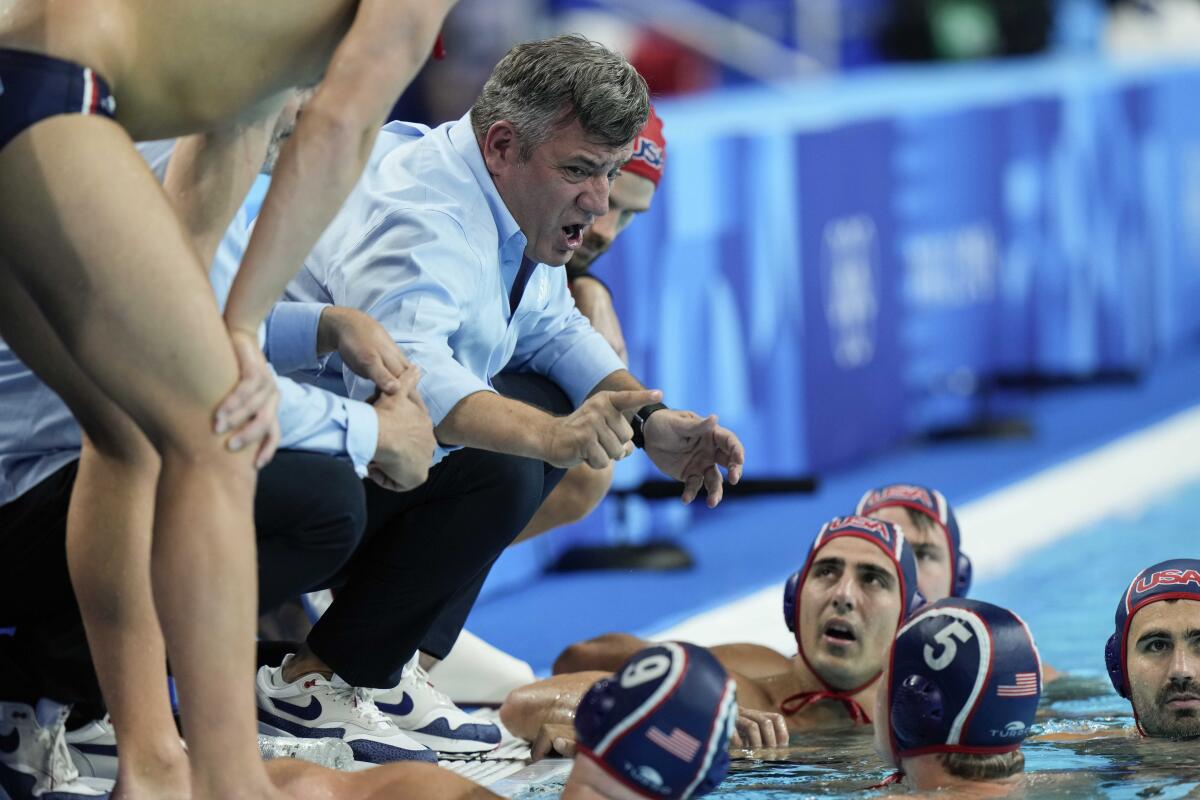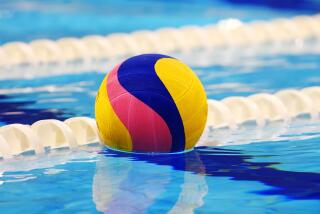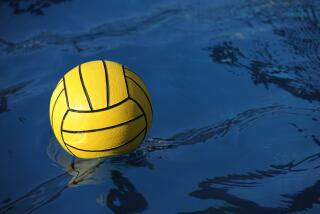Amid strong Paris run, U.S. men’s water polo aims to shine brighter in L.A.

NANTERRE, France — The Los Angeles Olympics are four years away, which can seem like a lifetime for a water polo player. Yet those Games already loom as the most important in more than a generation for the U.S. men’s team, which took its first bold steps toward 2028 this week in Paris by playing for a medal for the first time in 16 years.
It won’t be playing for gold after losing Friday’s semifinal, 10-6, to Serbia, the two-time defending Olympic champion, to fall into Sunday’s bronze-medal match. When your team has made the final four just once in the last three decades, however, the color of the medal isn’t as important as making sure you win one.
“No matter what, the result in this tournament is better than we’ve had in a long time,” U.S. captain Ben Hallock said. “But we’re not going to be happy with fourth.”
The reason the 2028 Games will be so important for U.S. Water Polo is timing. Just once this century has the men’s team played in an Olympic tournament that had a favorable TV schedule for U.S. audiences; much of the time, the men’s matches followed infomercials or went up against the morning news shows.
But in Los Angeles, water polo could get a prime-time platform, giving it a once-in-a-lifetime chance to introduce the sport to a wider audience. Entering those Games as defending medalists, even if the medal is bronze, would make the men’s team even more compelling programming.
“We only have a couple times where we were in the spotlight, and that’s during the Olympics. And when we get a fraction of the world’s eyes on us, it’s time to show what we’ve put together for our entire lives. It’s for this,” defender Alex Bowen, one of 12 Californians on the team, said of playing for a spot on the medal stand.
And that’s the other part of the timing issue because, medals aside, the U.S. team in Paris is the best in more than a decade. It’s young, with seven of the 13 players 26 or younger, experienced, with 10 players having participated in at least two Olympics, and successful, having won a bronze medal in last year’s World Cup and back-to-back silvers in the last two FINA World League tournaments.
That gives the team a lot of momentum to carry into Los Angeles.

“This is the most talented team I’ve been a part of,” said Bowen, a three-time Olympian. “We’ve got a lot of youth, but especially over the last two, three years, everybody’s been able to go play abroad, play in Europe, play in professional leagues against grown men who are trying to put food on the table.
“There’s a difference in that. There’s a difference play[ing] abroad, to play against the top competition available.”
It would be hard to find better competition than the team the U.S. faced Friday. Since becoming an independent country in 2006, Serbia has medaled in every Olympic tournament it has played in, with its last two medals being gold.
The U.S., meanwhile, was playing without defender Johnny Hooper, who was suspended after drawing a rare brutality penalty in the quarterfinal win over Australia. The Americans still managed to take a pair of one-score leads in the first period before Serbia went ahead to stay on a goal from Petar Jaksic halfway through the second period.
The U.S. women’s water polo team lost in a penalty shootout to Australia during an Olympics semifinal. The team is well-versed in handling tragedy.
But the Serbians won the game with defense, holding the U.S. to five goals in 14 extra-player opportunities and shutting the Americans out over the final 12:42.
“To win on this level, you need to score,” U.S. coach Dejan Udovicic said. “We didn’t score.”
Udovicic, in his 11th year as national team coach, also acknowledged his team’s progress — “everybody sees the progress,” he said “and it’s obvious” — but he’s not thinking beyond Sunday’s bronze-medal game against Hungary, much less four years into the future.
“I’m just living in the present,” he said. “I’m proud of these guys.”
Bowen struck a similar tone before conceding that the road to L.A. indeed begins Sunday.
“I’ll leave the 2028 thoughts for a couple days from now,” he said. “We’re quick to mourn, quick to forget, and take it into the bronze-medal match and try to take home some hardware so we can really look at our family proudly and say, ‘Hey, come come to L.A. We’re going to be back.’”
More to Read
Go beyond the scoreboard
Get the latest on L.A.'s teams in the daily Sports Report newsletter.
You may occasionally receive promotional content from the Los Angeles Times.







